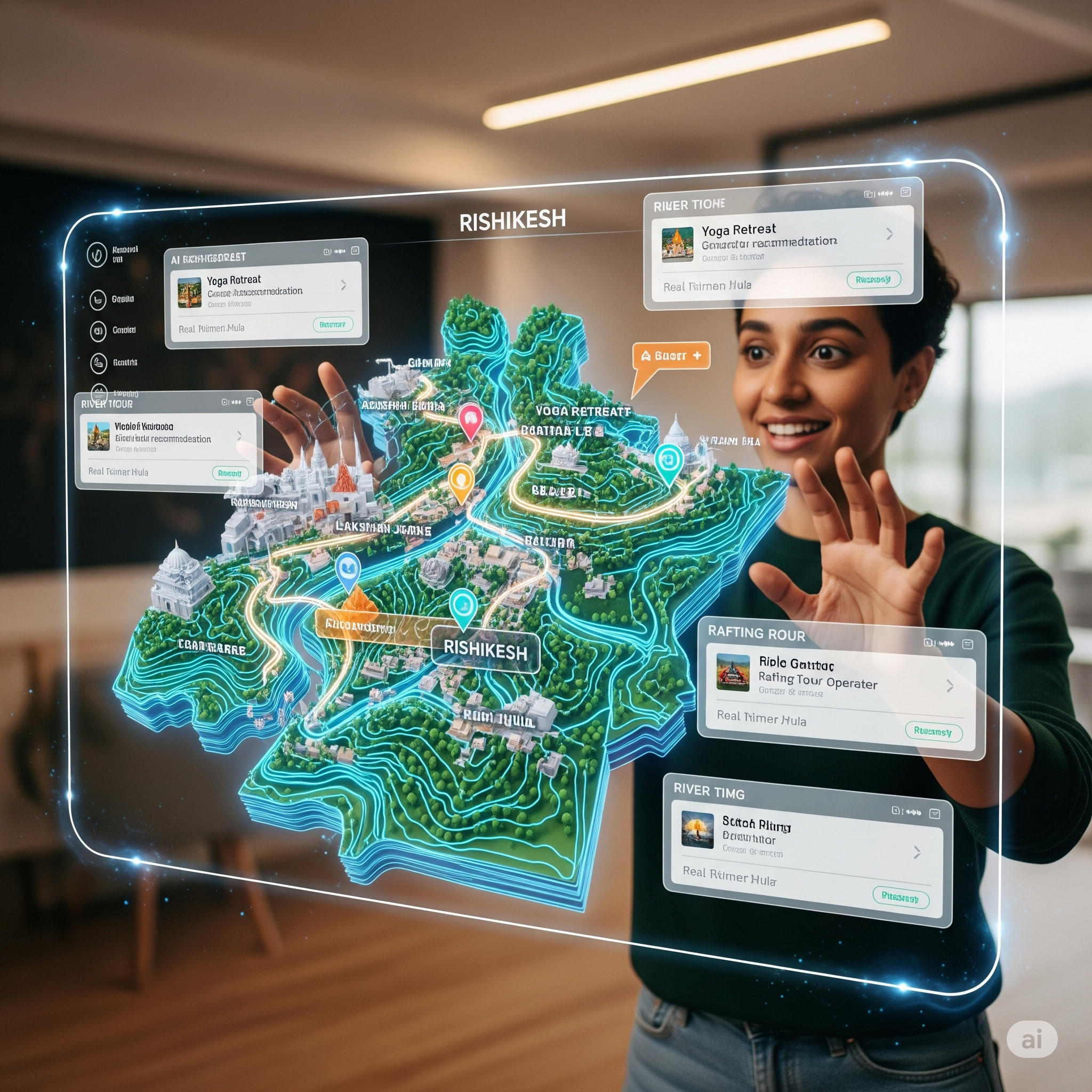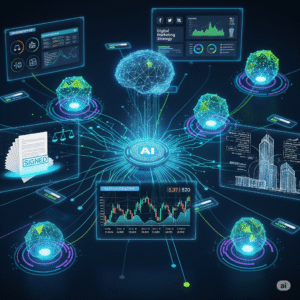Remember the last time you planned a vacation? You likely spent hours glued to your screen. During that time, you probably sifted through a dizzying maze of travel blogs, review sites, and booking engines. You waded through a sea of “Top 10” lists that all looked suspiciously the same, trying to piece together a trip that felt like you. However, this familiar story of frustration is beginning to change. What if an intelligence that understands your unique tastes could craft your next journey for you, down to the last detail? This isn’t science fiction; in fact, it’s the new reality of AI personalized travel.
Consequently, the days of one-size-fits-all package tours and generic itineraries are numbered. We are standing at the forefront of a travel revolution. An artificial intelligence now does more than just find the cheapest flight; it powers this new era. It acts as your personal concierge, data analyst, and creative travel partner all in one. This evolution is transforming the entire industry. As a result, it’s shifting the focus from simple transactions to creating deeply resonant and unforgettable experiences. Effective AI travel planning is no longer about just getting from point A to B. Instead, it’s about curating the entire alphabet of experiences in between, making every moment count.
What Exactly is AI Personalized Travel?
At its core, AI personalized travel uses smart algorithms to analyze huge amounts of data. The system then delivers travel recommendations, itineraries, and services tailored to your specific tastes. Think of it as the difference between a generic city guidebook and a personal tour from a local who knows all your favorite things. Put simply, instead of showing you what’s popular, it shows you what’s perfect for you.
This technology works by looking beyond simple search queries. For instance, it considers your past booking history, the articles you read, and your social media activity. It also factors in your budget, your travel pace, and even real-time data like weather. By identifying patterns in this information, AI can predict what you’ll enjoy with astounding accuracy. This process moves travel from a reactive model where you search and it finds. In its place is a proactive one where an AI anticipates and suggests your ideal vacation, sometimes before you even realize you want it.
The Engine Room: How AI Powers Your Perfect Trip
The magic behind AI personalized travel isn’t really magic at all. Rather, it’s a sophisticated combination of data processing, predictive modeling, and intelligent automation. These components work together seamlessly, ultimately turning raw information into a bespoke travel blueprint.
Data Analysis: The Core of AI Travel Planning
The foundation of any smart system is data. Specifically, AI platforms sift through an incredible volume of information that a human could never process. This includes:
- User Data: Your search history, previous trips, loyalty program activity, and stated preferences.
- Public Data: Flight prices, hotel availability, weather forecasts, and schedules for local events.
- Unstructured Data: Millions of hotel reviews, travel blogs, and social media posts. An AI can perform sentiment analysis to understand the feeling behind a review, not just its star rating.
This is where the concept of global content AI becomes crucial. For an AI to be truly effective, it must understand cultural context and local nuances from around the world. For example, an AI that can differentiate between “bohemian” in Bali and “bohemian” in Paris provides far more accurate recommendations. This capability ensures the travel experience is both authentic and respectful.
Predictive Analytics for Proactive Suggestions
After analyzing the data, AI uses predictive analytics to anticipate your needs. For instance, if your Browse history shows a love for off-the-beaten-path hiking trails, the AI won’t bother showing you crowded resorts. Instead, it might proactively suggest a charming, lesser-known mountain lodge that just had a cancellation. This intelligent forecasting makes the AI travel planning process feel less like a chore. In fact, it becomes a delightful discovery that saves you time and introduces you to new experiences.
Real-World Magic: AI Personalized Travel in Action
Leading companies already use this technology to enhance the customer journey and, in turn, their bottom line. The applications are diverse and incredibly practical. Furthermore, they impact everything from how you book to what you do on the ground.
- Hyper-Personalized Recommendations: Just as streaming services recommend movies, travel platforms now use AI to curate lists of hotels and activities “Just for You.”
- Dynamic Pricing: AI algorithms constantly analyze supply, demand, and other factors to adjust prices in real-time. This helps businesses maximize revenue while offering competitive deals.
- Intelligent Chatbots & Virtual Assistants: 24/7 AI-powered chatbots can handle booking queries and answer questions. They can even act as a real-time travel assistant, offering suggestions for a rainy day.
- Optimized Itineraries: Advanced AI trip planner tools can build an entire itinerary from scratch. You simply input your destination, interests, and budget, and the AI generates a logical and personalized schedule.
Case Studies: Companies Winning with AI Travel Planning
It’s one thing to talk about theory. It’s another to see how businesses are turning data into decisions and profit. Two giants in the travel industry, Booking.com and Tripadvisor, provide excellent examples of AI personalized travel at scale.
Case Study 1: Booking.com’s Data-Driven Dominance
Booking.com provides a masterclass in using AI to enhance user experience. The company processes an immense amount of data from its millions of users daily. Its AI models analyze which properties users click on, which photos they view, and what features they filter for. This information then feeds a powerful recommendation engine that personalizes the platform for every user.
Their success lies in the subtlety of this personalization. For example, the AI might notice you consistently book hotels with a high “walkability” score and a gym. The next time you search, the platform will rank properties matching this profile higher for you. It often adds a small tag explaining why it made the recommendation. This process creates a powerful feedback loop. Essentially, the more you use the platform, the smarter it gets, which boosts both customer loyalty and conversion rates.
Case Study 2: Tripadvisor’s AI for Authentic Insights
Tripadvisor’s primary asset is its massive repository of over a billion user-generated reviews. Manually analyzing this much text would be impossible. Therefore, the company leverages sophisticated machine learning to make sense of it all. A McKinsey report on the travel industry highlights how AI helps Tripadvisor move beyond simple star ratings.
Their AI can identify recurring themes and sentiments within reviews. For example, it determines if a hotel is “great for families” by analyzing mentions of “playgrounds” and “spacious rooms.” It doesn’t just rely on reviewers explicitly saying so. This allows Tripadvisor to create nuanced categories and deliver more reliable recommendations. This deep analysis, a form of global content AI, ensures the insights are genuinely helpful for travelers. As a result, their AI travel planning tools become incredibly powerful.
Your AI Toolkit for Smarter Travel and Business Intelligence
The good news is that powerful AI tools are no longer exclusive to tech giants. Today, businesses of all sizes—and even savvy individuals—can leverage AI to make smarter decisions. Here are a few tools that can help:
- ChatGPT: An incredibly versatile tool from OpenAI. For a travel business, it can brainstorm marketing copy or analyze customer feedback. For a traveler, it can act as a powerful AI trip planner to build a custom itinerary.
- Tableau: A market-leading data visualization tool. Travel agencies can use it to visualize booking trends, identify profitable customer segments, and understand marketing ROI.
- MonkeyLearn: A user-friendly platform specializing in text analysis. You can use it to automatically categorize customer feedback or run sentiment analysis on thousands of reviews, helping you quickly understand customer opinions.
Getting Started: A Beginner’s Workflow for AI-Powered Analysis
Are you feeling inspired to bring some AI magic into your planning? Fortunately, you don’t need a degree in data science to start. Here is a simple, beginner-friendly workflow:
- Gather Your Data: First, collect the information you already have. This could be a spreadsheet of past bookings or reviews from your Google Business Profile.
- Ask the Right Questions: Next, know what you want to find out. Are you trying to identify your most popular tour or the most common complaint?
- Use an Accessible Tool: Then, use a tool like ChatGPT. Copy and paste unstructured text like reviews and ask direct questions, such as: “Analyze these 20 reviews and list the top 5 positive themes.”
- Visualize for Clarity: For numerical data, even simple charts in Google Sheets can reveal powerful insights. For instance, create a bar chart of bookings by month to see seasonal trends.
- Act and Iterate: Finally, use these insights. If customers who book hiking tours also ask about vegetarian restaurants, you should create relevant content. Then, as you gather more data, you can refine your offerings further, as suggested in this guide from HubSpot on data analysis.
The Future of AI Personalized Travel: What’s on the Horizon?
The journey of AI personalized travel is just beginning. In fact, the future promises an even deeper level of integration that will make today’s technology seem quaint. We are moving towards true hyper-personalization. Soon, an AI assistant could plan a multi-country trip that seamlessly accommodates your diet, fitness goals, and even your mood.
The role of global content AI will also grow, enabling systems to craft experiences that are both personalized and sustainable. Imagine an AI suggesting a local artisan co-op because it aligns with your interest in supporting local economies. The ultimate vision is a proactive, invisible AI travel assistant. It will manage everything from rebooking a canceled flight to adjusting your dinner reservation. This will create a truly frictionless and magical travel experience. Indeed, this is the ultimate promise of AI travel planning: to give us back our time and a sense of wonder.
Speak to the World: How AI Translation Tools Conquer Language Barriers
Cure Writer’s Block & Write Killer Dialogue: The AI Screenwriting Guide



